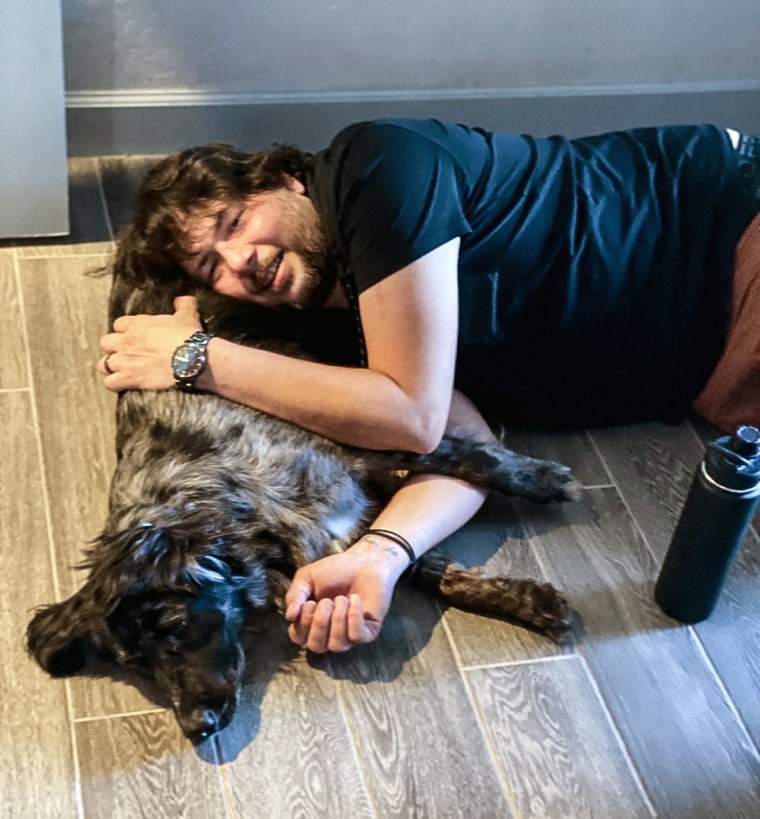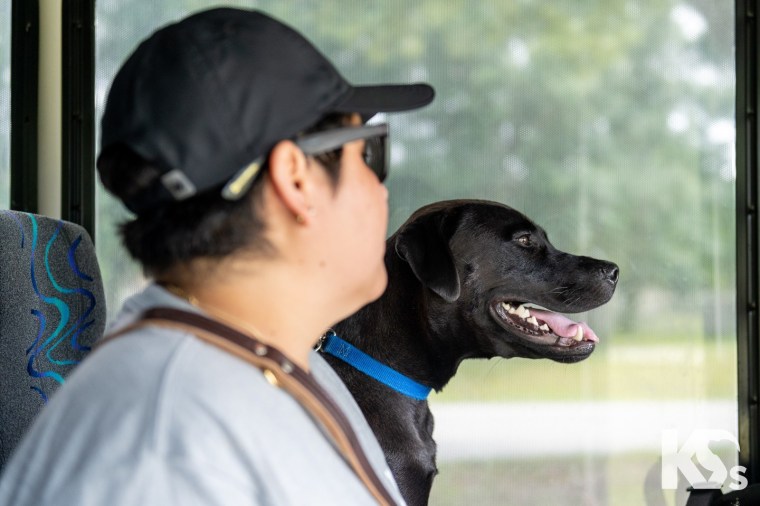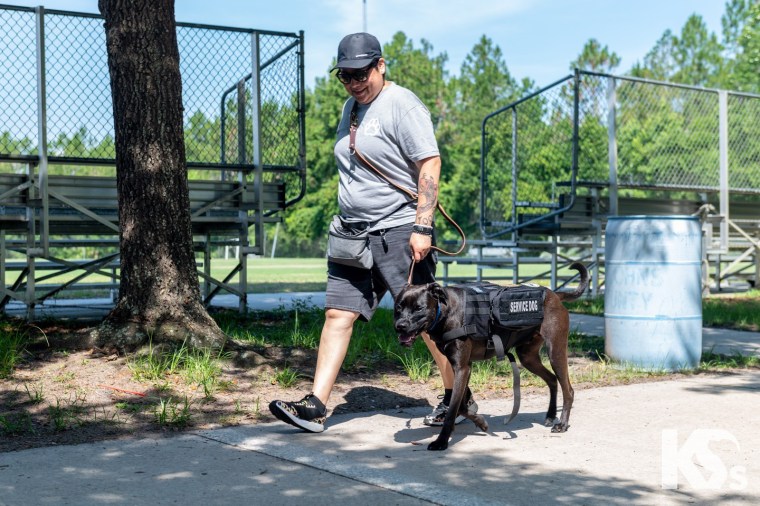José Romero, a 42-year-old Army veteran who served in Afghanistan and Iraq, never thought that a dog could change his life.
“When I left the Army, I was in pretty bad shape. I was having nightmares, sweating, and had a lot of anxiety. I didn’t want to get out of my house,” he told NBC News in an interview.
His outlook was bleak, he said, until he was partnered with a service dog named Poppy.
K9s for Warriors, an organization that has rescued over 1,500 dogs from shelters and trained them as service dogs for veterans with post-traumatic stress disorder, or PTSD, matched Romero with Poppy — an Australian shepherd — in June. The Puerto Rican veteran said Poppy is the help that he needed to stay alive.
“In the military, we don’t always try to get help because we want to be all that we can be. But you need to look for help,” he said. “I tried to commit suicide three times. And I am still here because I got help.”

Carl Cricco, CEO of K9s for Warriors, said via email that ending veteran suicide is the program's top mission. He pointed out that many veterans “found renewed enjoyment in life, and significantly reduced their medications” after getting partnered with a service dog.
Romero was born in Bayamón, Puerto Rico, and was raised in Staten Island, New York. He joined the Army in 2001, when he was 22, after enlisting in the National Guard in Puerto Rico one year earlier. While he initially entered the military as a way to pay for college, he eventually wanted to make a career out of the Army.
“I was deployed twice,” he said. “In Afghanistan, I was working in the S-1 office [human resources] doing paperwork. And I went on missions too. That’s why I have my combat infantry badge. In Iraq, I was infantry. I was clearing houses and dealing with a lot of heavy stuff, like ambushes.”
Romero served six years in the Army and was later diagnosed with PTSD. Now the support he gets from Poppy, he said, helps him go out more and remain independent.
“You can take a service dog with you everywhere. For example, when I go to a store to pay, I don’t like having anyone standing behind me because it gives me anxiety,” Romero said. “And Poppy stands behind me to make sure nothing happens. And she knows when I have anxiety, she comes to me.”
Romero, who works at the William Beaumont Army Medical Center in El Paso, Texas, said not many veterans know about K9s for Warriors.
His wife, Brenda, who is a nurse practitioner in psychiatry, encouraged him to apply for a service dog. While he had to wait five years for Poppy, he thanks his wife and his service dog for showing him how life could get better.
"If I would have killed myself, I would have never lived to see my twin girls," Romero said. "I would have never seen how life could be good."
How service dogs can help
Maggie O’Haire, associate dean at the University of Arizona's College of Veterinary Medicine, studies K9s for Warriors as part of her research into the ways humans interact with animals. Veterans, she said, are struggling.
“They face depression, anxiety and higher rates of suicide when compared with civilians,” she said. “If you look at the numbers, veterans are dying by suicide at more than double the rate of civilian adults. And they’re three to five times more likely to have depression than individuals without PTSD.”
O’Haire said that while anecdotes about veterans partnering with service dogs are inspiring, it's data and science that determines “what insurance will cover, what funders will pay for, and what clinicians will endorse.”
The Department of Veterans Affairs, for example, says on its website that “there is not enough research to know if dogs help treat PTSD and symptoms.” However, the PAWS Act, signed into law in 2021, requires the VA to conduct a five-year pilot program to test out supporting service dogs for eligible veterans with PTSD.
So far, O’Haire said, research based on participants from K9s for Warriors is showing that veterans with service dogs are struggling significantly less.
“They have clinically lower levels of PTSD symptoms — about 25% less. They have 30% lower depression and 10% lower anxiety,” she said. “If we look at quality of life, they report having three times higher overall psychological well-being. And for those who are employed, there’s five times less absenteeism from work due to health.”
But getting a service dog for veterans with PTSD is still a challenge.
“The waitlist for service dogs on average tends to be two years. That was the average before Covid. Right now, we know the average has gone up to five years from the day they apply,” O'Haire said. “This is is one of the reasons that we try to bring science and research to the table, because funders supporting organizations are looking for data.”
A Labrador who's 'very in tune'
Alejandra Figueroa, 42, is a Mexican American veteran who enlisted in the Army one day before her 23rd birthday in 2003.
She was deployed three times: first to Guantanamo Bay and then twice to Afghanistan. During her nine years of service, Figueroa performed many duties including customs and border patrol, corrections and detainee transfers, and perimeter control.
Figueroa now works for the Department of Military and Veterans Affairs in Los Angeles County. But she said when she left the Army in 2012, her life was in a very different place. Figueroa didn’t know much about PTSD, and she tried to live without treatment.

“My mom was actually the very first person to tell me that I probably had PTSD. And then it was confirmed by a job that I applied for and didn’t get,” she explained. “They said the main reason I did not get the job was because of PTSD. And in 2019, that’s when I actually began to get treatment at the VA. My psychiatrist later recommended that I look into a service dog.”
K9s for Warriors partnered Figueroa with Hardee, a black Labrador mix, in June. She said Hardee makes her become more aware.
“He’s very in tune with everything around me. And he’s also very good at making me understand myself,” she said, referring to Hardee. “Sometimes I don’t get what he’s doing, but then I realize he is making me feel a certain way and that’s why he’s doing it.”
Cricco, K9s for Warriors' CEO, said the organization wants to empower veterans to live with “dignity and independence.”
For Figueroa, who has a lower-back injury that can sometimes make walking difficult, her service dog not only helps her get back on her feet physically, but also elevates her mentally to achieve that independence.
"Hardee is like a life companion. But I don’t want to sound like I live in a cell," she said. "I wanted to get a service dog more for independence, so that I could go out and handle things on my own without having to continuously place a burden on others."
Follow NBC Latino on Facebook, Twitter and Instagram
